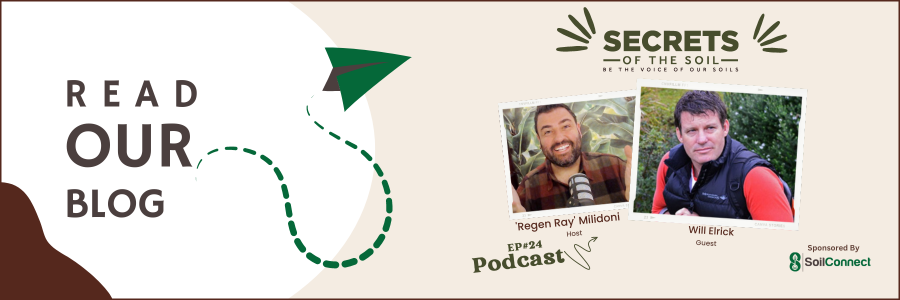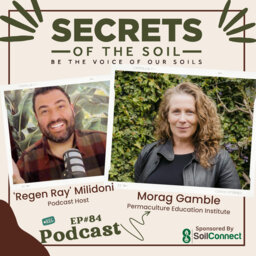Excited to share our latest episode on Secrets of the Soil: “To Certify or NOT To Certify – That is The Million Dollar Regenerative Question,” with special guest, Will Elrick! Join host ‘Regen Ray’ Milidoni as we dive deep into the importance of holistic land management, the complexities of organic certification, and the future of sustainable farming. 🚜
🎙️ Episode Highlights:
In this thought-provoking conversation, you’ll gain insights about:
– The importance of understanding your land and recognizing nature’s signals.
– The impact of agricultural practices on soil health and ecosystem dynamics.
– The challenges and considerations of organic certification in the regenerative agriculture movement.
🔑 Key Takeaways for You:
– Holistic Management: Focus on nurturing the soil and ecosystem dynamics for sustainable agriculture.
– True Value of Certification: Certification processes should prioritize output quality and support farmers, rather than just compliance.
– Collaborative Approach: Encourage collaboration and mental health support in the agricultural community for a successful transition to sustainability.
Tune in now and explore the journey towards a healthier, more regenerative future for our soils and farms. 🌍💚
Who is Will Elrick?
Erick has been involved with Agroecology and nature-based solutions for around ten years. Working and also training on an Agroecological farm in Albury, southern NSW. During that time, I did Agroecology at Charles Sturt University, which later life happened, and I had to move to Northern NSW. He completed a Bachelor of Science with Honours. It was a social study based on the role certification has played in the Organic industry and what the Regen can learn.

In episode 24 of “Secrets of the Soil,” host ‘Regen Ray’ Milidoni sits down with agroecologist Will Elrick to delve into the intricacies of soil health, land management, and the debated value of agricultural certification. Their conversation sheds light on the importance of literacy in the land, the holistic approach to farming, and the challenges and potential of certification in the regenerative agriculture movement.
Understanding the Signals from the Land
One of the central themes in this episode is the importance of understanding and interpreting the signals from nature. Milidoni shares an experience from a farm tour that emphasized the need for literacy of the land—understanding the nuances and signs that the soil and plants communicate.
Elrick echoes this sentiment by discussing a farmer’s switch from a static farming system to a rotating one, demonstrating how such a paradigm shift can influence the land’s succession and ecosystem. For example, Elrick recounts instances of stunted tree growth due to compacted soil from previous agricultural practices, highlighting how essential it is to work with the land rather than against it.
The Importance of Holistic Land Management
Both Elrick and Milidoni emphasize that holistic land management is vital for a healthy ecosystem. The concept goes beyond merely focusing on soil health but integrates the entire ecosystem, including the relationships and successions of plants and trees. By understanding and nurturing these dynamics, farmers can foster a more resilient and productive landscape.
One of the critical insights Elrick offers is the role of plant succession in indicating soil health. Different plants thrive at various stages of soil recovery, and their presence can provide valuable clues about the land’s condition and necessary interventions.
The Role of Certification in Regenerative Agriculture
A significant portion of the discussion revolves around the contentious issue of certification in the organics and regenerative agriculture movements. Elrick recounts the explosive growth of organic farming in Australia after the introduction of certification, which was initially intended to ensure quality and trustworthiness. However, over time, the certification process became mired in complexity, bureaucracy, and significant costs, often emphasizing the inputs rather than the quality of the outputs.
The conversation highlights the blurred lines between industrial and certified organic farming due to regulatory changes, which complicated farmers’ abilities to conduct their own audits for exports. This situation led to exploitation of the term “organic” and moved the focus away from genuinely sustainable practices.
Reevaluating the Certification Process
Elrick calls for a reevaluation of the certification process, advocating for a model that prioritizes the quality of the products and supports farmers through their transitions without penalizing them for struggling to comply with rigid regulations. He suggests a shift towards verification and accreditation that emphasizes long-term ecological sustainability and landscape health.
One innovative idea discussed is the integration of mental health considerations and the measurement of landscape health, such as organic matter ratings on packaging. This holistic approach recognizes the interconnectedness of the environment and human well-being, proposing a more comprehensive system for evaluating agricultural practices.
The Importance of Soil Literacy and Biodiversity
Throughout the conversation, the speakers underscore the need for soil literacy and the understanding of biodiversity in sustainable agriculture. Elrick’s passion for soil biology, particularly mycorrhizae fungi, highlights the critical role these organisms play in maintaining healthy soil ecosystems. Their discussion stresses that nurturing the soil is foundational for regenerative practices, regardless of the specific methodologies employed.
Elrick also shares his research experiences during the COVID-19 pandemic, which included interviewing industry experts and balancing perspectives from both organic and regenerative farming sectors. This research underscores the need for balanced data collection and the importance of embracing diverse viewpoints to forge a more inclusive and effective path forward.
Moving Towards a Collaborative Future
In closing, both Elrick and Milidoni emphasize the need for collaboration and support within the farming community. Transitioning to sustainable practices is a journey that requires shared knowledge, mutual support, and a collective commitment to long-term ecological health.
Milidoni encourages listeners to embrace the ethos of getting outside, getting their hands dirty, and considering the quality of the food they purchase. He reminds us that the soil is the foundation of regenerative practices and that by working with and respecting the land, we can create healthier, more sustainable agricultural systems.
The episode serves as a powerful reminder of the importance of understanding and respecting the land, supporting each other through the transition to sustainable practices, and reevaluating certification processes to focus on quality and ecological health. As we navigate the complexities of regenerative agriculture, the insights from this conversation can guide us towards a more sustainable and collaborative future.






